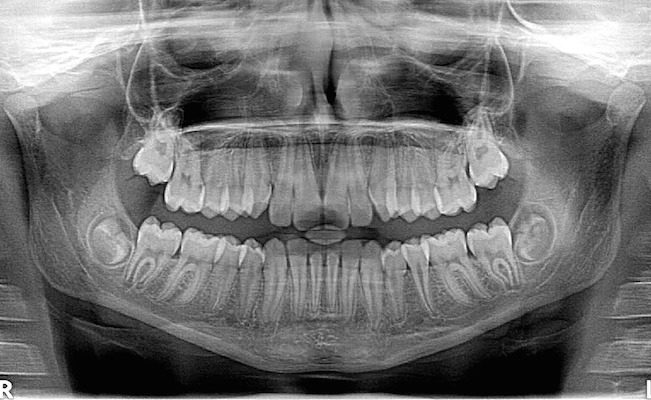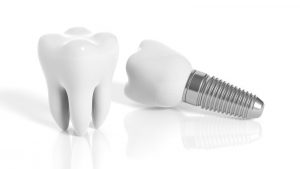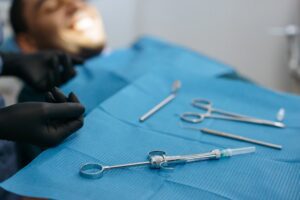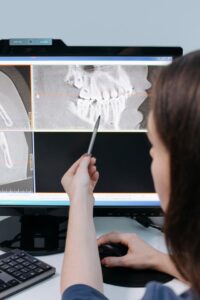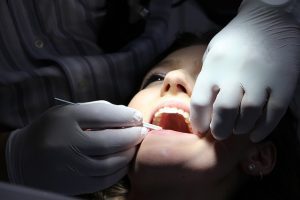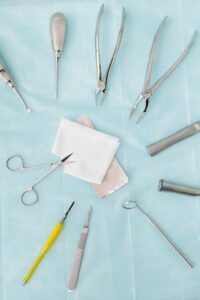So your oral surgeon confirms that you are a candidate for dental implants, but you’ll need a dental bone graft first. This is a fairly common procedure in oral surgery. It is sometimes needed if the jawbone isn’t strong enough, as is often the case if you’ve had missing teeth and the jawbone has worn away as a result.
A dental bone graft involves removing parts of bone from your jaw and transplanting them in the area of the jaw that needs support — where you’ll get the dental implant. Once your dental bone graft is complete, it will need to heal until we can proceed with the dental implant surgery.
Who Typically Needs a Bone Graft?
Not everyone needs a dental bone graft in order to have a successful dental implant. It is usually needed for people who have lost a tooth, suffered tooth damage, or other facial trauma. These situations can cause your jawbone to deteriorate to the point that your mouth wouldn’t otherwise accept a dental implant.
Bone deficiency is typically caused by several ailments or incidents, including:
- Gum disease/periodontal disease
- Developmental issues or natural defects
- Tooth loss or removal of teeth
- Facial trauma
Types of Dental Bone Grafts
When it comes to oral surgery, there are several different types of dental bone grafts that can be done. What one is right for you depends on the extent of bone loss and where the tooth is located.
A socket graft is the most common type of dental bone graft. Its goal is to avoid atrophy of the alveolar bone. With a socket graft, the bone is placed directly in the socket to prevent collapse. You’ll need about 4 to 6 months to heal before we can proceed with the dental implant surgery. The good news is a socket graft can minimize postoperative pain from the implant surgery.
Another approach is the lateral ridge preservation graft. This is done to increase jawbone width so there is enough space for the implant. We’ll typically use your own jawbone for this procedure.
For large defects to the jawbone, we’ll perform a block bone graft. First, we take a bit of bone from the back of your jaw, which we place into the grafting area. The bone graft will need to be held in place with small titanium screws.
Finally, there is the sinus lift procedure, which we’ll use a combination of equine bone and your own bone. This approach is typically needed if the upper jaw is not stable enough to accept a dental implant.
Are Dental Bone Grafts Painful?
Not at all! We use a variety of methods of sedation dentistry so you are completely comfortable throughout the procedure. You may experience some discomfort in the days following your dental bone graft, but this pain can be managed through medication.
You may experience swelling after the procedure. We suggest applying an ice pack (or even a bag of frozen veggies in a pinch) to bring down the swelling.
Dietary Considerations After a Bone Graft
For a few days after your oral surgery, you’ll need to be mindful of what you eat. Stick to soft foods, fluids and soups. Avoid eating hard, crunchy and sharp food like fried chicken or nuts. If the bone graft surgery is fairly minor, you may be able to eat oatmeal, scrambled eggs, mashed potatoes, puréed fruit, and pudding.
After Your Dental Bone Graft Surgery
For the next several nights after your dental bone graft, sleep on your back with your head elevated by several pillows. Avoid sleeping on the side where the surgery was performed.
You should also avoid any strenuous activity, work or exercise. Don’t engage in football, running, wrestling, boxing, or any other physically demanding sports.
After a few days of recovery, you should be able to return to your normal activity.
A Word About Smoking
Smoking severely diminishes the body’s natural ability to heal because it impedes blood flow. It will slow down the healing process. We recommend you quit smoking altogether, or at least stop a month before your surgery and avoid smoking until your surgery has completely healed.
